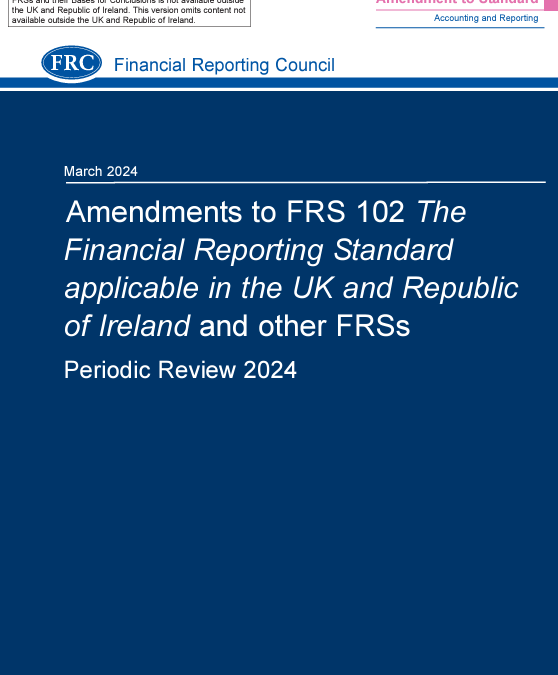Revenue recognition and lease accounting rules are the main changes from January 2026 arising from newly published amendments to FRS 102.
On 27th March the Financial Reporting Council published a 285 page list of the Amendments to FRS 102, FRS 105 and other FRSs. These changes will come into force from 1 January 2026 with early adoption allowed, provided all the changes are adopted simultaneously.
The changes are too extensive to be covered in this short blog but here is a flavour of what’s changing.
An earlier effective date (among changes in other FRS) applies to new disclosures about supplier finance arrangements in Section 7 of FRS 102 ‘Statement of Cash Flows’ for periods beginning on or after 1 January 2025, with early application permitted.
Where an entity adopts these amendments early:
- In the UK it shall disclose that fact (regardless of entity size), while,
- Small entities in the Republic of Ireland, are encouraged to disclose that fact.
Revenue Recognition -the main change is the use of the 5 step model from (IFRS 15) which will impact businesses that have contracts that bundle goods and services with variable consideration, warranties, customer options or significant financing components. It’s unlikely that this will impact most SMEs that much. No restatement of comparatives is required on transition.
Lease accounting – lessors will see little change, but for lessees there are major changes. Right of use assets (RoU) (as defined) are to be capitalised on the balance sheet as a RoU asset with a corresponding liability.
There are exemptions for certain:
- short term leases (defined as a lease that, at the commencement date, has a lease term of 12 months or less. A lease that contains a purchase option is not a short-term lease; and
- low value assets – defined more in terms of what they are not than what they are. The FRS gives a list of what are not on the list including cars, buses, trucks, tractors, land and buildings.
Such leases will still be treated as operating leases, taking the lease expense to profit or loss and a finance charge on the lease liability.
Like the transition rules on revenue recognition no restatement of comparatives is required on transition to the new leasing provisions.
The main impact of the leasing changes will be that EBITDA measures will change because the operating lease expense is replaced by depreciation on the asset and interest occurring on the unwinding of the corresponding lease liability as the lease is paid. For some businesses this may have a negative impact on debt covenants involving EBITDA measures.
The Financial Reporting Council will issue updated Staff Factsheets and the actual Standards themselves later in 2024. It’s hoped that by having an implementation period of 21 months before the effective date rather than the original promise of ‘at least 12 months’, the extended period will provide a bit more breathing space for users.
To hear more about the latest AML developments and how to be on the alert for suspicions of money laundering and terrorist financing under the Criminal Justice (Money Laundering and Terrorist Financing) Acts 2010 to 2021, see our latest Anti-Money Laundering webinar here.
All our courses are listed here.
Please also go to our website to see our:
- Anti-Money Laundering Policies Controls & Procedures Manual (March 2022) – View the Table of Contents click here.
- AML Webinar (December 2023) available here, which accompanies the AML Manual. It explains the latest legal AML reporting position for accountancy firms and includes a quiz. Upon completion, you receive a CPD Certificate of attendance in your inbox.
- letters of engagement and similar templates. Please visit our site here where immediate downloads are available in Word format. A bulk discount is available for orders of five or more items if bought together.
- ISQM TOOLKIT or if you prefer to chat through the different audit risks and potential appropriate responses presented by this new standard, please contact John McCarthy FCA by e-mail at john@jmcc.ie.
- We typically tailor ISQM training and brainstorming sessions to suit your firm’s unique requirements. The ISQM TOOLKIT 2022 is available to purchase here.






